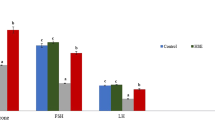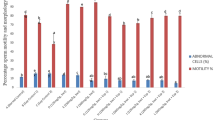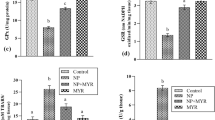Abstract
The use of additives, especially colorants, in food and pharmaceutical industry is increasing dramatically. Currently, additives are classified as contaminants of emerging concern (CECs). Concerns have been raised about the potential hazards of food additives to reproductive organs and fertility. The present study investigates the reproductive toxicity of tartrazine (TRZ), a synthetic colorant, in male rats and aims to explore the curative effect of Ginkgo biloba extract (EGb) against TRZ-induced testicular toxicity. Twenty-four rats were divided into four groups: the control (0.5 ml distilled water), the EGb group (100 mg/kg EGb alone), the TRZ group (7.5 mg/kg TRZ alone), and the TRZ-EGb group (7.5 mg/kg TRZ plus 100 mg/kg EGb). The doses were administered orally in distilled water once daily for 28 days. Toxicity studies of TRZ investigated testicular redox state, serum gonadotropins, and testosterone levels, testicular 17 ß-hydroxysteroid dehydrogenase activity, sperm count and quality, levels of inflammatory cytokines, and caspase-3 expression as an apoptotic marker. Also, histopathological alterations of the testes were examined. TRZ significantly affected the testicular redox status as indicated by the increase in malondialdehyde and the decrease in reduced glutathione, superoxide dismutase, and catalase. It also disrupted serum gonadotropins (follicle stimulating hormone and luteinizing hormone) and testosterone levels and the activity of testicular 17ß-hydroxysteroid dehydrogenase. Additionally, TRZ adversely affected sperm count, motility, viability, and abnormality. Levels of tumor necrosis factor-α, interleukin-1β, interleukin-6, and expression of caspase-3 were increased in the testes. Histopathological examination of the testes supported the alterations mentioned above. Administration of EGb significantly ameliorated TRZ-induced testicular toxicity in rats. In conclusion, EGb protected against TRZ-induced testicular toxicity through antioxidant, anti-inflammatory, and anti-apoptotic mechanisms.







Similar content being viewed by others
Data availability
The data used in the analysis are available from the corresponding author upon reasonable request.
References
Abd El-Maksoud EM, Lebda MA, Hashem AE, Taha NM, Kamel MA (2019) Ginkgo biloba mitigates silver nanoparticles-induced hepatotoxicity in Wistar rats via improvement of mitochondrial biogenesis and antioxidant status. Environ Sci Pollut Res 26(25):25844–25854. https://doi.org/10.1007/s11356-019-06392-4
Abd-Elhakim YM, Hashem MM, El-Metwally AE, Anwar A, Moustafa GG, Ali HA (2018) Comparative haemato-immunotoxic impacts of long-term exposure to tartrazine and chlorophyll in rats. Int Immunopharmacol 63:145–154. https://doi.org/10.1016/j.intimp.2018.08.002
Abd-Elkareem M, Abd El-Rahman MAM, Khalil NSA, Amer AS (2021) Antioxidant and cytoprotective effects of Nigella sativa L seeds on the testis of monosodium glutamate challenged rats. Sci Rep 11(1):13519. https://doi.org/10.1038/s41598-021-92977-4
Aebi H (1984) Catalase in vitro. Meth Enzymol 105:121-126. https://doi.org/10.1016/S0076-6879(84)05016-3
Aitken RJ, Jones KT, Robertson SA (2012) Reactive oxygen species and sperm function-in sickness and in health. J Androl 33(6):1096–1106. https://doi.org/10.2164/jandrol.112.016535
Akgül T, Ayyildiz A, Nuhoğlu B, Karagüzel E, Oğüş E, Yağmurdur H, Ustün H, Germiyanoğlu C (2008) Ginkgo biloba (EGb 761) usage attenuates testicular injury induced by testicular ischemia/reperfusion in rats. Int Urol Nephrol 40(3):685–690. https://doi.org/10.1007/s11255-007-9296-5
Albasher G, Maashi N, Alfarraj S, Almeer R, Albrahim T, Alotibi F, Bin-Jumah M, Mahmoud AM (2020) Perinatal exposure to tartrazine triggers oxidative stress and neurobehavioral alterations in mice offspring. Antioxidants 9(1):53. https://doi.org/10.3390/antiox9010053
Amin AK, Hameid AH II, Abd Elsstar HA (2010) Effect of food azo dyes tartrazine and carmoisine on biochemical parameter related to renal, hepatic function and oxidative stress biomarkers in young male rats. Food Chem Toxicol 48(10):2994–2999. https://doi.org/10.1016/j.fct.2010.07.039
Anderson RA, Baird DT (2002) Male contraception. Endocr Rev 23(6):735–762. https://doi.org/10.1210/er.2002-0002
Ayad B, Omolaoye TS, Louw N, Ramsunder Y, Skosana BT, Oyeipo PI, Du Plessis SS (2022) Oxidative stress and male infertility: evidence from a research perspective. Front Reprod Health 4:822257. https://doi.org/10.3389/frph.2022.822257
Beutler E, Duron O, Kelly BM (1963) Improved method for the determination of blood glutathione. J Lab Clin Med 61:882–888
Birch GF, Drage DS, Thompson K, Eaglesham G, Mueller JF (2015) Emerging contaminants (pharmaceuticals, personal care products, a food additive and pesticides) in waters of Sydney estuary, Australia. Mar Pollut Bull 97:56–66. https://doi.org/10.1016/j.marpolbul.2015.06.038
Chan PC, Xia Q, Fu PP (2007) Ginkgo biloba leave extract: biological, medicinal, and toxicological effects. J Environ Sci Health C Environ Carcinog Ecotoxicol Rev 25(3):211–244. https://doi.org/10.1080/10590500701569414
de Souza PF, Monteiro JC, Matta SLP, Garcia MC, Dolder H (2011) Testicular histomorphometry and ultrastructure of rats treated with cadmium and Ginkgo biloba. Biol Trace Elem Res 140(3):330–341. https://doi.org/10.1007/s12011-010-8702-5
Delwiche J (2004) The impact of perceptual interactions on perceived flavor. Food Qual Prefer 15(2):137–146. https://doi.org/10.1016/S0950-3293(03)00041-7
Demirkol O, Zhang X, Ercal N (2012) Oxidative effect of tartrazine (Cas No. 1934-21-0) and new coccin (Cas No. 2611-82-7) azo dyes on CHO cells. J Verbrauch Lebensm 7(3):229–236. https://doi.org/10.1007/s00003-012-0782-z
EFSA panel on food additives and nutrient sources added to food (2009) Scientific opinion on the re-evaluation tartrazine (E 102) on request from the European Commission. EFSA J 7(11):1331. https://doi.org/10.2903/j.efsa.2009.1331
Elekima I, Nwachuku OE (2019) Evaluation of acute and chronic toxicity of tartrazine (E102) on steriod reproductive hormones of albino rats. Asian J Res Rep Endocrin 2(1):1–15
Erdemli ME, Gul M, Altinoz E, Zayman E, Aksungur Z, Bag HG (2017) The protective role of crocin in tartrazine induced nephrotoxicity in Wistar rats. Biomed Pharmacother 96:930–935. https://doi.org/10.1016/j.biopha.2017.11.150
Essawy AE, El-Sayed SA, Tousson E, Abd El-gawad HS, Alhasani RH, Abd Elkader HA (2022) Anti-kindling effect of Ginkgo biloba leaf extract and L-carnitine in the pentylenetetrazol model of epilepsy. Environ Sci Pollut Res 29:48573–48587. https://doi.org/10.1007/s11356-022-19251-6
Essawy AE, Mohamed AI, Ali RG, Ali AM, Abdou HM (2023) Analysis of melatonin-modulating effects against tartrazine-induced neurotoxicity in male rats: biochemical, pathological and immunohistochemical markers. Neurochem Res 48(1):131–141. https://doi.org/10.1007/s11064-022-03723-9
Filler R (1993) Methods for evaluation of rat epididymal sperm morphology. Male Reprod Toxicol 3:334–343. https://doi.org/10.1016/B978-0-12-461207-5.50025-0
Fu Z, Lin L, Liu S, Qin M, He S, Zhu L, Huang J (2019) Ginkgo biloba extract inhibits metastasis and ERK/nuclear factor kappa B (NF-κB) signaling pathway in gastric cancer. Med Sci Monit: Int Med J Exp Clin Res 25:6836–6845. https://doi.org/10.12659/MSM.915146
Gomaa DH, Hozayen WG, Al-shafeey MH, Elkelawy AMH, Hashem KS (2020) Ginkgo biloba alleviates cisplatin-mediated neurotoxicity in rats via modulating APP/Aβ/P2X7R/P2Y12R and XIAP/BDNF-dependent caspase-3 apoptotic pathway. Appl Sci 10(14):4786. https://doi.org/10.3390/app10144786
Han Y, Hu LX, Liu T, Liu J, Wang YQ, Zhao JH, Liu YS, Zhao JL, Ying GG (2022) Non-target, suspect and target screening of chemicals of emerging concern in landfill leachates and groundwater in Guangzhou. South China Sci Total Environ 837(6):155705. https://doi.org/10.1016/j.scitotenv.2022.155705
Hong CY, Park JH, Ahn RS, Im SY, Choi HS, Soh J, Mellon SH, Lee K (2004) Molecular mechanism of suppression of testicular steroidogenesis by pro-inflammatory cytokine tumor necrosis factor alpha. Mol Cell Biol 24(7):2593–2604. https://doi.org/10.1128/MCB.24.7.2593-2604.2004
Hsu SM, Raine L, Fanger HX (1981) Use of avidin-biotin peroxidase complex (ABC) in immune peroxidase techniques: a comparison between ABC and unlabelled antibody (PAP) procedures. J Histochem Cytochemy 29(4):577–580. https://doi.org/10.1177/29.4.6166661
Hu GX, Liang G, Chu Y, Li X, Lian QQ, Lin H, He Y, Huang Y, Hardy DO, Ge RS (2010) Curcumin derivatives inhibit testicular 17beta-hydroxysteroid dehydrogenase 3. Bioorg Med Chem Lett 20(8):2549–2551. https://doi.org/10.1016/j.bmcl.2010.02.089
Khayyat L, Essawy A, Sorour J, Soffar A (2017) Tartrazine induces structural and functional aberrations and genotoxic effects in vivo. PeerJ 5:e3041. https://doi.org/10.7717/peerj.3041
Kosasa TS (1981) Measurement of human luteinizing hormone. J Reprod Med 26:201–206. https://doi.org/10.1172/JCI105762
Krausz C, Riera-Escamilla A (2018) Genetics of male infertility. Nat Rev Urol 15(60):369–384. https://doi.org/10.1038/s41585-018-0003-3
Lempart-Rapacewicz A, Kudlek E, Brukało K, Rapacewicz R, Lempart L, Dudziak M (2023) The threat of food additive occurrence in the environment- a case study on the example of swimming pools. Foods 12(6):1188. https://doi.org/10.3390/foods12061188
Liu L, Wang Y, Zhang J, Wang S (2021) Advances in the chemical constituents and chemical analysis of Ginkgo biloba leaf, extract, and phytopharmaceuticals. J Pharm Biomed Anal 193(300):113704. https://doi.org/10.1016/j.jpba.2020.113704
Liu JB, Li ZF, Lu L, Wang ZY, Wang L (2022) Glyphosate damages blood-testis barrier via NOX1-triggered oxidative stress in rats: long-term exposure as a potential risk for male reproductive health. Environ Int 159:107038. https://doi.org/10.1016/j.envint.2021.107038
Loveland KL, Klein B, Pueschl D, Indumathy S, Bergmann M, Loveland BE, Hedger MP, Schuppe HC (2017) Cytokines in male fertility and reproductive pathologies: Immunoregulation and beyond. Front Endocrinol 8:307. https://doi.org/10.3389/fendo.2017.00307
Mansour DF, Saleh DO, Ahmed-Farid OA, Rady M, Bakeer RM, Hashad IM (2021) Ginkgo biloba extract (EGb 761) mitigates methotrexate-induced testicular insult in rats: targeting oxidative stress, energy deficit, and spermatogenesis. Biomed Pharmacother 143(1):112201. https://doi.org/10.1016/j.biopha.2021.112201
Martin LJ, Touaibia M (2020) Improvement of testicular steroidogenesis using flavonoids and isoflavonoids for prevention of late-onset male hypogonadism. Antioxidants 9(3):237. https://doi.org/10.3390/antiox9030237
Mehedi N, Ainad-Tabet S, Mokrane N, Addou S, Zaoui C, Kheroua O, Saidi D (2009) Reproductive toxicology of tartrazine (FD and C Yellow No. 5) in Swiss albino mice. Am J Pharmacol Toxicol 4(4):130–135. https://doi.org/10.3844/ajptsp.2009.130.135
Mohammed NA, Abdou HM, Tass MA, Alfwuaires M, Abdel-Moneim AM, Essawy AE (2020) Oral supplements of Ginkgo biloba extract alleviate neuroinflammation, oxidative impairments and neurotoxicity in rotenone-induced parkinsonian rats. Curr Pharm Biotechnol 21(12):1259–1268. https://doi.org/10.2174/1389201021666200320135849
Mpountoukas P, Pantazaki A, Kostareli E, Christodoulou P, Kareli D, Poliliou S, Mourelatos C, Lambropoulou V, Lialiaris T (2010) Cytogenetic evaluation and DNA interaction studies of the food colorants amaranth, erythrosine and tartrazine. Food Chem Toxicol 48(10):2934–2944. https://doi.org/10.1016/j.fct.2010.07.030
Nishikimi M, Rao NA, Yagi K (1972) The occurrence of superoxide anion in the reaction of reduced phenazine methosulfate and molecular oxygen. Biochem Biophys Res Commun 46(2):849–854. https://doi.org/10.1016/s0006-291x(72)80218-3
Noor-E-Tabassum DR, Lami MS, Chakraborty AJ, Mitra S, Tallei TE, Idroes R, Mohamed AA, Hossain MJ, Dhama K, Mostafa-Hedeab G, Emran TB (2022) Ginkgo biloba: a treasure of functional phytochemicals with multi-medicinal applications. Evid Based Complement Alternat Med 2022:8288818. https://doi.org/10.1155/2022/8288818
O’Flaherty C (2020) Reactive oxygen species and male fertility. Antioxidants 9(4):287. https://doi.org/10.3390/antiox9040287
Ohkawa H, Ohishi N, Yagi K (1979) Assay for lipid peroxides in animal tissues by thiobarbituric acid reaction. Anal Biochem 95(2):351–358. https://doi.org/10.1016/0003-2697(79)90738-3
Penning TM, Mukharji I, Barrows S, Talalay P (1984) Purification and properties of a 3α-hydroxysteroid dehydrogenase of rat liver cytosol and its inhibition by anti-inflammatory drugs. Biochem J 222(3):601–611. https://doi.org/10.1042/bj2220601
Raposa B, Pónusz R, Gerencsér G, Budán F, Gyöngyi Z, Tibold A, Hegyi D, Kiss I, Koller Á, Varjas T (2016) Food additives: sodium benzoate, potassium sorbate, azorubine, and tartrazine modify the expression of NFκB, GADD45α, and MAPK8 genes. Physiol Int 103(3):334–343. https://doi.org/10.1556/2060.103.2016.3.6
Sadžak A, Mravljak J, Maltar-Strmečki N, Arsov Z, Baranović G, Erceg I, Kriechbaum M, Strasser V, Přibyl J, Šegota S (2020) The structural integrity of the model lipid membrane during induced lipid peroxidation: the role of flavonols in the inhibition of lipid peroxidation. Antioxidants 9(5):430. https://doi.org/10.3390/antiox9050430
Saeed GMS, Sayeed AS, Ashraf S, Batool FN, Ali R, Nas A, Siddiqi R (2011) Investigations of in vitro digestibility of proteins bound to food colors. J Pharm Nutr Sci 1(1):34–40. https://doi.org/10.6000/1927-5951.2011.01.01.07
Sakr SA, Lamfon AH, Essawy AE (2011) Ginger (Zingiber Officinale) extract ameliorates metalaxyl fungicide induced nephrotoxicity in albino mice. Afr J Pharm Pharmacol 5(2):104–112. https://doi.org/10.5897/AJPP.9000163
Salimi M, Esrafili A, Gholami M, JonidiJafari A, RezaeiKalantary R, Farzadkia M, Kermani M, Sobhi H (2017) Contaminants of emerging concern: a review of a new approach in AOP technologies. Environ Monit Assess 189:414. https://doi.org/10.1007/s10661-017-6097-x
Sherif IO, Al-Mutabagani LA, Sarhan OM (2020) Ginkgo biloba extract attenuates methotrexate-induced testicular injury in rats: cross-talk between oxidative stress, inflammation, apoptosis, and miRNA-29a expression. Integr Cancer Ther 19:1534735420969814. https://doi.org/10.1177/1534735420969814
Shu P, Sun M, Li J, Zhang L, Xu H, Lou Y, Ju Z, Wei X, Wu W, Sun N (2020) Chemical constituents from Ginkgo biloba leaves and their cytotoxicity activity. J Nat Med 74(1):269–274. https://doi.org/10.1007/s11418-019-01359-8
Sikka SC (1996) Oxidative stress and role of antioxidants in normal and abnormal sperm function. Front Biosci 1(5):e78–e86. https://doi.org/10.2741/a146
Simoni M, Gromol J, Nieschlag E (1997) The follicle-stimulating hormone receptor: biochemistry, molecular biology, physiology, and pathophysiology. Endocr Rev 18(6):739–773. https://doi.org/10.1210/edrv.18.6.0320
Singh A, Kukreti R, Saso L, Kukreti S (2022) Mechanistic insight into oxidative stress-triggered signaling pathways and type 2 diabetes. Molecules 27(3):950. https://doi.org/10.3390/molecules27030950
Slott VL, Suarez JD, Perreault SD (1991) Rat sperm motility analysis: methodologic considerations. Reprod Toxicol 5(5):449–458. https://doi.org/10.1016/0890-6238(91)90009-5
Suescun MO, Rival C, Theas MS, Calandra RS, Lustig L (2023) Involvement of tumor necrosis factor-alpha in the pathogenesis of autoimmune orchitis in rats. Biol Reprod 68(6):2114–2121. https://doi.org/10.1095/biolreprod.102.011189
Talbot P, Chacon RS (1981) A triple-stain technique for evaluating normal acrosome reactions of human sperm. J Exp Zool 215(2):201–208. https://doi.org/10.1002/jez.1402150210
Tanaka T (2006) Reproductive and neurobehavioural toxicity study of tartrazine administered to mice in the diet. Food Chem Toxicol 44(2):179–187. https://doi.org/10.1016/j.fct.2005.06.011
Tremellen K (2008) Oxidative stress and male infertility- a clinical perspective. Hum Reprod Update 14(3):243–258. https://doi.org/10.1093/humupd/dmn004
Verma S, Ranawat P, Sharma N, Nehru B (2019) Ginkgo biloba attenuates aluminum lactate-induced neurotoxicity in reproductive senescent female rats: behavioral, biochemical, and histopathological study. Environ Sci Pollut Res 26(26):27148–27167. https://doi.org/10.1007/s11356-019-05743-5
Wopara I, Modo EU, Mobisson SK, Olusegun GA, Umoren EB, Orji BO, Mounmbegna PE, Ujunwa SO (2021) Synthetic food dyes cause testicular damage via up-regulation of pro-inflammatory cytokines and down-regulation of FSH-R and TESK-1 gene expression. JBRA Assist Reprod 25(3):341–348. https://doi.org/10.5935/1518-0557.20200097
Wu C, Zhao X, Zhang X, Liu S, Zhao H, Chen Y (2015) Effect of Ginkgo biloba extract on apoptosis of brain tissues in rats with acute cerebral infarction and related gene expression. Genet Mol Res 14(2):6387–6394. https://doi.org/10.4238/2015.June.11.14
Yeh YC, Liu TJ, Wang LC, Lee HW, Ting CT, Lee WL, Hung CJ, Wang KY, Lai HC, Lai HC (2009) A standardized extract of Ginkgo biloba suppresses doxorubicin-induced oxidative stress and p53-mediated mitochondrial apoptosis in rat testes. Br J Pharmacol 156(1):48–61. https://doi.org/10.1111/j.1476-5381.2008.00042.x
Author information
Authors and Affiliations
Contributions
Amina Essawy and Heba Abdou contributed to the conception and design of the study. Materials preparation and data collection were performed by Shreen Mattar and Nema Mohammed. Data analysis was performed by Amina Essawy, Shreen Mattar, Nema Mohammed, Wessam Abdel-Wahab, and Heba Abdou. Wessam Abdel-Wahab, Nema Mohammed, and Shreen Mattar prepared the figures and tables. The first draft of the manuscript was written and critically revised by Wessam Abdel-Wahab and Amina Essawy. All authors read and approved the final manuscript.
Corresponding author
Ethics declarations
Ethics approval
The following statement was provided for the ethical approval: The procedures of the experiment are compatible with the Institutional Animal Care and Use Committee (IACUC) at Alexandria University (approval number AU04190226101).
Consent to participate
Not applicable.
Consent for publication
Not applicable.
Informed consent
Not applicable.
Competing interests
The authors declare no competing interests..
Additional information
Responsible Editor: Mohamed M. Abdel-Daim
Publisher's Note
Springer Nature remains neutral with regard to jurisdictional claims in published maps and institutional affiliations.
Rights and permissions
Springer Nature or its licensor (e.g. a society or other partner) holds exclusive rights to this article under a publishing agreement with the author(s) or other rightsholder(s); author self-archiving of the accepted manuscript version of this article is solely governed by the terms of such publishing agreement and applicable law.
About this article
Cite this article
Essawy, A., Matar, S., Mohamed, N. et al. Ginkgo biloba extract protects against tartrazine-induced testicular toxicity in rats: involvement of antioxidant, anti-inflammatory, and anti-apoptotic mechanisms. Environ Sci Pollut Res 31, 15065–15077 (2024). https://doi.org/10.1007/s11356-024-32047-0
Received:
Accepted:
Published:
Issue Date:
DOI: https://doi.org/10.1007/s11356-024-32047-0




